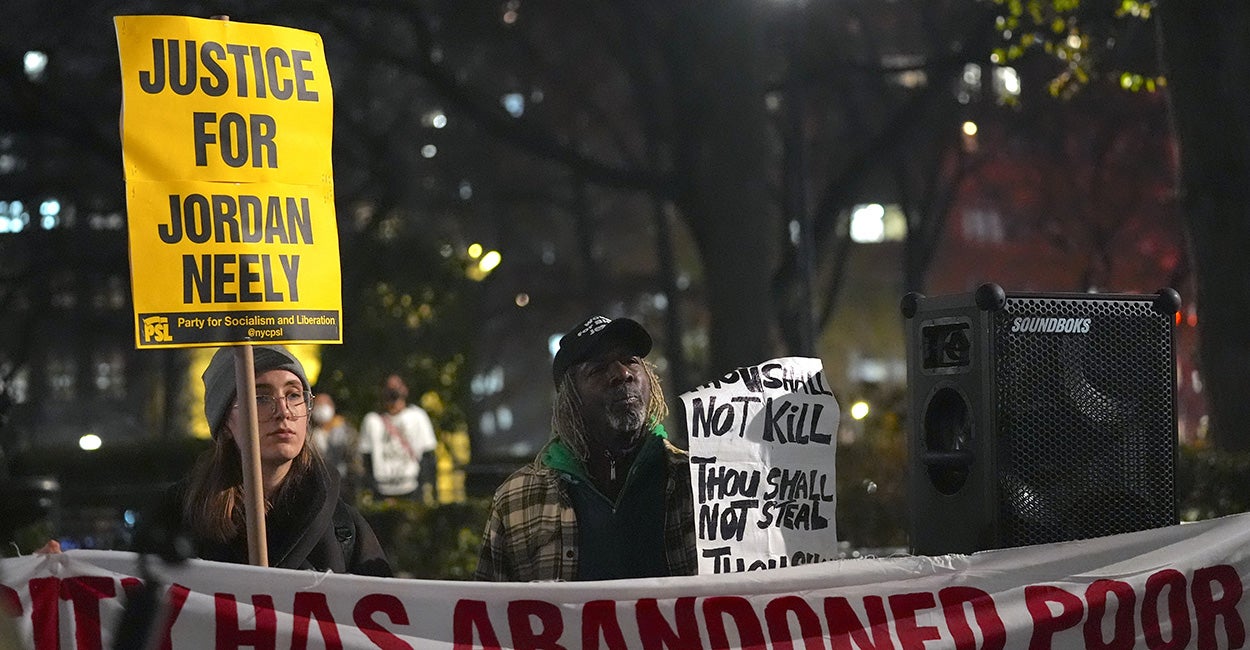Jordan Neely could have been my brother. Both were diagnosed with severe schizophrenia, both with violent criminal histories, and both forcibly, temporarily hospitalized at Bellevue Hospital—New York City’s flagship hospital for the mentally ill.
The stark difference: My mother and I proactively fought the legal battle for guardianship of my brother to keep him off the streets—away from harm to himself or others. Because we chose to take a stand for him, my brother is safe and alive.
What’s infuriating now in the wake of Neely’s tragic death is that his family wants to make money off his passing. Instead, Neely’s family should arguably face charges of negligence for failing to keep him out of jail and off the streets. But our country’s terrible laws around mental health will not hold Neely’s family accountable, and his father is attempting to exploit racial grievance to distract from his exceptionally poor fathering.
The Daily Signal depends on the support of readers like you. Donate now
Both Neely and my brother were arrested for elder abuse. Police took my brother to a mental facility in the Kansas City area after he punched my then-85-year-old, Alzheimer’s-stricken father, giving our dad a deeply bruised black eye. Neely in 2021 punched a 67-year-old woman as she departed the Manhattan Bowery subway station, landing him a plea deal to stay for 15 months in free, stable housing at a Bronx mental health treatment facility. Neely left the facility after 13 days, leading to a warrant for his arrest.
Neely was arrested 44 times for assaults, drugs, indecent exposure, and other crimes. In 2015, police arrested Neely for dragging a 7-year-old girl down the street (attempting to kidnap her), and he spent time in jail for that.
Neely and Daniel Penny would never have met if Neely’s father had given a damn. Neely’s nonfamily caregivers describe how he bounced in and out of mental facilities, jail, and homeless facilities. There was no consistency; there were no proactive measures reported to get custody of him through guardianship.
The guardianship process takes time, effort, patience, and—unless you obtain free indigent legal care—money and legal bills. But it’s possible, and there’s no evidence that Neely’s father even tried.
I led this custody journey firsthand within my own family. As I describe in my recent memoir, “Motorhome Prophecies,” I have two adult schizophrenic brothers who also bounced in and out of mental health care facilities. The elder brother voluntarily signed over guardianship to my mother, a loving caregiver who effectively manages his treatment.
My younger brother refused, triggering us to jump through numerous legal hoops to obtain his guardianship for my mom so he could move to a facility—permanently, if necessary—to protect my father.
Neely would have qualified for all sorts of Medicaid and disability funding to permanently cover the costs of his care in what is known as a “locked facility.” Locked means Neely could not exit of his own volition without permission of his guardian.
Nobody chose to love Neely enough to become his guardian, causing him to drift to “unlocked facilities” where he could float in and out onto the streets. Neely suffered severe trauma after his mother’s boyfriend murdered her and stuffed her body into a suitcase.
This heartbreaking situation demands change.
Our mental health laws are too libertarian. It is far too difficult to forcibly contain someone who is deeply mentally ill—like Neely clearly was—and get him permanent care.
It wasn’t always this way. The Community Mental Health Act of 1963 brought watershed changes to mental health policy, seeking to treat patients in communities, homes, and outpatient facilities instead of residential, inpatient psychiatric hospitals. New York State began a deinstitutionalization effort in the 1970s to transition from large-scale institutions to smaller community centers.
This effectively emptied mental facilities with patients who then occupied prisons and the streets instead. Proof that good intentions don’t match outcomes.
The 1975 Supreme Court ruling in Rogers v. Okin (siding with the Mental Patients’ Liberation Front) established a patient’s right to refuse treatment. The same year, the Supreme Court’s O’Connor v. Donaldson ruling decreed states cannot confine a nondangerous individual who can survive on his own. Of course who is “dangerous” and what constitutes “surviving” are subjective, leading to foul-smelling tent cities and lax criminal enforcement from the left-wing George Soros-funded local prosecutors nationwide.
This means people who are extremely vulnerable have their own cognizance to sign themselves out of a facility unless a family member or loved one gains custody of them.
Neely’s case provides clear solutions: To keep vulnerable mental health patients safe and alive, prosecutors must enforce our laws, and Congress must reverse our ill-advised policies around deinstitutionalization. In the meantime, fathers must love their sons and fight for their lives.
Carrie Sheffield is author of “Motorhome Prophecies: A Journey of Healing and Forgiveness.”
We publish a variety of perspectives. Nothing written here is to be construed as representing the views of The Daily Signal.






























